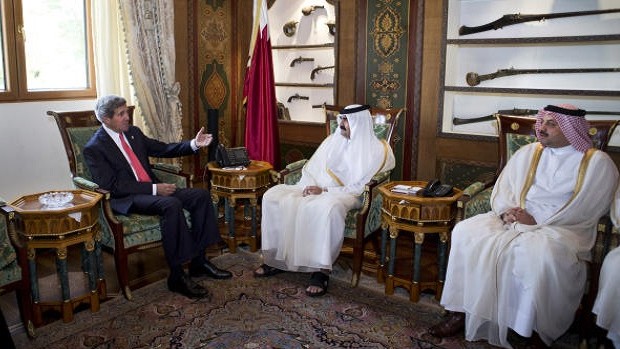
U.S. Secretary of State John Kerry, left, gestures while meeting with Qatari Emir Hamad bin Khalifa Al Thani, center, at Wajbah Palace in Doha, Qatar, on Sunday, June 23, 2013. (AP Photo/Jacquelyn Martin, Pool)
Qatari prime minister and foreign minister, Sheikh Hamad bin Jassim Al-Thani, said the meeting made “secret decisions as to the practical steps to be taken to change the situation on the ground in Syria,” adding: “we think the international community is not doing enough on this issue. We hope the international community wakes up after confirmation of the use of chemical weapons by three countries; the US, Britain and France.”
Sheikh Hamad praised what he called the awakening of the French, American and British positions, after confirming Syrian regime use of chemical weapons. He added that a political solution was the preferred option, not military intervention.
US Secretary of State John Kerry said the “international community was determined to end the violence in Syria and to support the opposition to reach a peaceful solution,” adding that the Doha meeting provided a good opportunity to help the Syrian people achieve freedom.
Kerry said Washington was moving ahead with providing the opposition with sophisticated weapons to achieve a balance of power between Assad and opposition forces more favorable to bringing about a political solution to the conflict.
He refused, however, to disclose the types of weapons the Americans would provide to the opposition, but insisted that Washington was eager to ensure that the weapons would not reach extremist groups.
Sheikh Hamad bin Jassim eched Kerry’s comments, saying: “We have to be firm . . . we have to provide all types of support to the opposition forces to enable them to reach their legitimate goals.”
The Qatari premier and foreign minister added that “moral support was not enough and we have to provide all types of support to the national coalition of opposition forces, and the military council to enable it to confront the regime’s forces, and the regional and international forces which support it.”
Commenting on the expected negative reaction of Russia and Iran to the peaceful solution, Sheikh Hamad said everyone should work on “putting the fires out,” adding that the “Arab League sent observers for two years and nothing was achieved, because the regime preferred the military option, while we are working to stop the war, because it is a dangerous evil.”
The foreign ministers, meeting in the Qatari capital Doha, also criticized Hezbollah’s military intervention in Syria, and emphasized that military aid was not an alternative to peace efforts.
Kerry said “the intervention of Hezbollah and Iran is a dangerous development,” adding that Hezbollah was acting as an agent for Iran in the region and that it was classified as a terrorist group.
While Britain has not yet officially decided to arm the opposition, Foreign Secretary William Hague said “we will not reach a political solution if Assad and his regime think they can destroy the legitimate opposition by force.”
French Foreign Minister Laurent Fabius said his country had provided the Syrian opposition with treatment for the Sarin nerve gas. On Iran and Hezbollah’s role in Syria, Fabius said “Hezbollah’s has played a very negative role, especially in the attack on Qusayr. We are against internationalizing the conflict, so, we call on Iran and Hezbollah to end their interference in this conflict.”
Within Syria, fighting has continued across the country on Sunday, while Damascus and Aleppo were both struck by bomb attacks. In Aleppo, where both sides are preparing for offensives to contest control of the area, reports say that 12 government troops were killed by a car bomb on the outskirts of the northern city.
Meanwhile, in Damascus, where the government has recently been fighting to expel rebels from the city’s suburbs, another bomb exploded in the Ruken Al-Deen district. The Syrian Observatory for Human Rights, a London based NGO, said that 3 people were killed and ten injured in the explosion, which it said struck a bakery. Syrian opposition activists said that the explosion targeted a facility used by pro-government militia forces, while Syrian state media reported the attack, but gave no indication of casualties.
